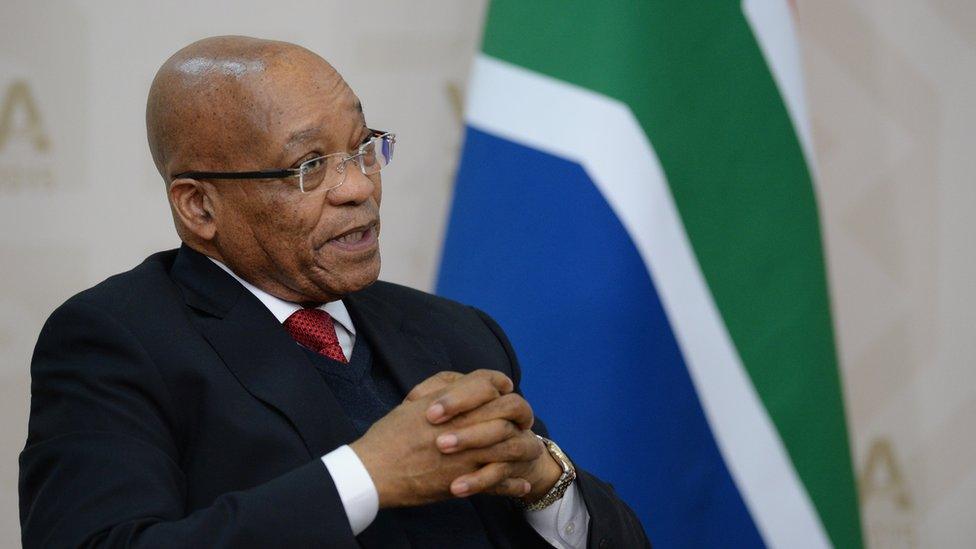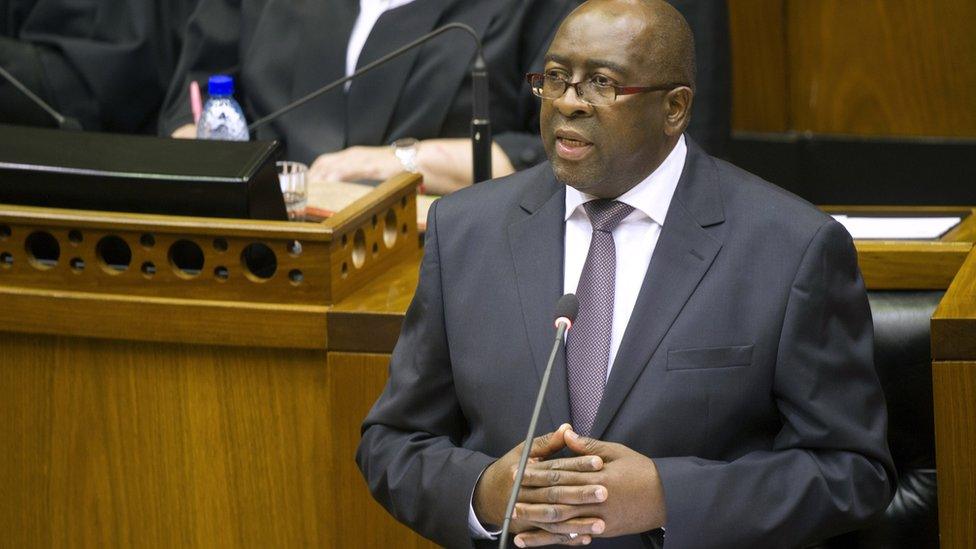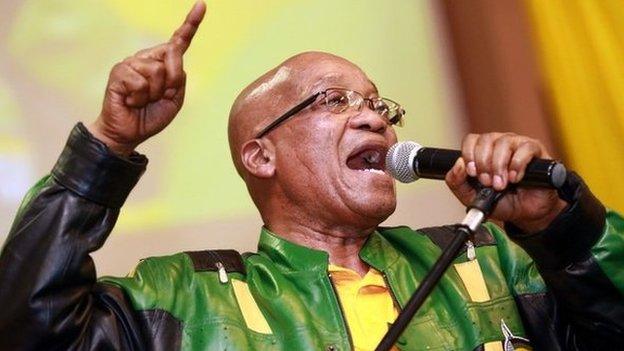South Africa's Finance Minister Pravin Gordhan warns state firms
- Published
Pravin Gordhan becomes South Africa's finance minister
South Africa's new finance minister has warned that state-owned companies should not be used as "personal toys".
Pravin Gordhan, the country's third finance minister in less than a week, was making his first comments since he was appointed on Sunday.
He refused to mention any names but there are concerns that some state-run firms are being poorly managed.
In a bid to reassure the markets, he said that the country "will stay the course of sound fiscal management".
Last week, President Jacob Zuma sacked previous Finance Minister Nhlanhla Nene in a widely criticised move that sent the rand to record lows.
Mr Gordhan replaced David van Rooyen who had only been in the job since Thursday.

Who is Pravin Gordhan?
Trained and worked as a pharmacist in Durban
One of the main negotiators in the drafting of South Africa's democratic constitution from 1991-1994
Ran South Africa's revenue service from 1999-2009
Served as finance minister from 2009-2014
Credited with pulling the country out of recession
Re-appointed finance minister in 2015

He told journalists, external that "it's time that individuals, or groups of individuals, stop playing with state entities... as if [they're] a personal toy from which you can extract money when you feel like".
"We do require a bit of national reflection... as to how do we want to manage state resources," he added.
Mr Nene's reluctance to approve a plan to build several nuclear power stations at a cost of up to $100bn is thought to have contributed to his removal as finance minister.
He also opposed plans for to buy a new presidential jet and to bail out the national airline.
Restore confidence
Mr Gordhan was widely respected when he served as South Africa's finance minister from 2009 until 2014.
But President Zuma's move to get rid of him drew a lot of criticism from within the governing ANC.
BBC Africa business reporter Lerato Mbele says his re-appointment is designed to quell market discontent and restore some confidence.
It appeared to have an immediate effect with the currency rising, recovering from just over 16 rand to the dollar to about 15 by Monday morning, according to currency site xe.com, external.
The Johannesburg stock exchange also recovered some of last week's losses.

Analysis: Milton Nkosi, BBC News, Johannesburg

The sackings have increased pressure on South African President Jacob Zuma
President Jacob Zuma's decision to fire two finance ministers in the space of a week has been a colossal blunder.
Not only has it been recognised by opposition parties, who are calling for his resignation, but also by the general public and the financial markets.
The president acknowledged his initial mistake, hence the change in mind.
But what is happening with the governing African National Congress?
The ANC leadership was not consulted and seemed to be hearing about the dramatic appointments at the same time as the rest of us.
There is no doubt that the continent's oldest liberation movement is in disarray.
President Zuma will emerge weaker but the party will not lose votes in the medium term - as people remain loyal to the movement if not the individual.

Mr Gordhan has a hard job with unemployment currently above 25%, growth sluggish and credit rating agency Fitch recently downgrading South Africa to one notch above "junk" status.
The brief tenure of Mr van Rooyen and the uncertainty it caused may have damaged South Africa's reputation further, analysts say.
Mohammed Nalla, head of research at Nedbank Capital, said having a finance minister serve just a few days did not bode well.
"International investors are probably thinking: 'Why didn't the president make a much more considered decision in the first place?'" he said.

The sacking of Finance Minister Nhlanhla Nene last week led to a sharp decline in the value of the rand
Former Health Minister Barbara Hogan on Friday called on Mr Zuma to resign. The highest-profile ANC member to oppose Mr Nene's removal, she said that the president had crossed a line and needed to be held to account.
Razia Khan, an analyst with Standard Chartered bank, said the turmoil was "perhaps the first instance since 2007 that Zuma has come under severe pressure within the party".
A statement from Mr Zuma's office, external said he had "received many representations" to reconsider his decision to appoint Mr van Rooyen.
"As a democratic government, we emphasise the importance of listening to the people and to respond to their views," it added.
Fitch said on Thursday that Mr Nene's sacking "raised more negative than positive questions".
- Published14 December 2015

- Published26 October 2015

- Published9 July 2024
